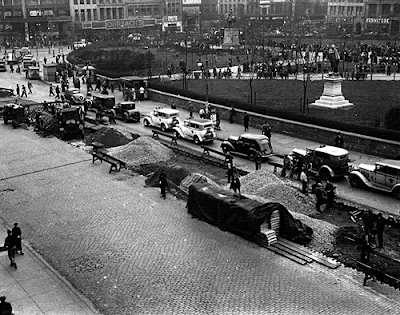JW: You've been a big supporter of ethanol. But studies show it doesn't do anything to reduce global warming, it's actually a less efficient way to produce energy than gasoline, and it's contributing to growing food shortages worldwide. Are you going to continue to back it?
BO: Corn-based ethanol I see as a transitional technology. We've got to invest in alternative fuels.
JW: This one is ranked as pretty bad.
BO: I understand, which is why we're going to have a transition from corn-based ethanol to cellulosic ethanol, not using food crops as the source of the energy.
JW: So you foresee this coming to an end.
BO: What I foresee is us transitioning into other ways of developing these energy sources. The fact that we had corn-based ethanol, and that industry has matured, provides us with distribution networks and infrastructure that can ultimately be used for other ethanol sources.
Obama is one of many who tout corn ethanol as a bridge to different kinds of ethanol. But while there is still promise in sugarcane ethanol, the jury is either out or has returned with a guilty verdict against corn, cellulosic, and other kinds of ethanol most fervently pushed by Americans.
Obama speaks of "distribution networks" for ethanol. Incidentally, I heard Naomi Klein talk about The Shock Doctrine last Wednesday, at the Barnes & Noble in Union Square (walking in with a Starbucks, she apologized for the "sold-out" event). One of her most important points, in my opinion, is that times of crisis are times of fear and growth; when the former wins, you get Fascism, when the latter triumphs, you get the New Deal. In terms of energy and the environment (and a dozen other issues), we are now at a crossroads not dissimilar to the early 1930s. In the U.S. then, Harold Ickes (Public Works Administration, which grew U.S. infrastructure), Harry Hopkins (Works Progress Administration, which grew the U.S. workforce), and many others spearheaded the investment of billions of dollars into building just the sort of "distribution networks" Obama mentions and Klein emphasizes are so critical to economic and environmental reclamation today.
If we play it safe and wrap ourselves in cozy blankets of rhetoric, we will be in a much worse place in 10, 50, 100 years. On the other hand, if a government can take the reins and create the infrastructure and the jobs for change, we'll be getting somewhere. In this case, what will the infrastructure and subsequent jobs look like? Maybe a large-scale mix of plants to develop hydrogen, solar, wind, and electric power...all better long-term options than ethanol.
And speaking of roads and change, I like this photo of a WPA crew removing old street car tracks on 4th Avenue in NYC. The photo was taken at 16th Street, facing south to 14th Street (the Orbach's department store was located at 48 East 14th Street from 1923 until 1954, and is now the location of the Union Square Whole Foods); note the treeless Union Square and its different statues.



No comments:
Post a Comment